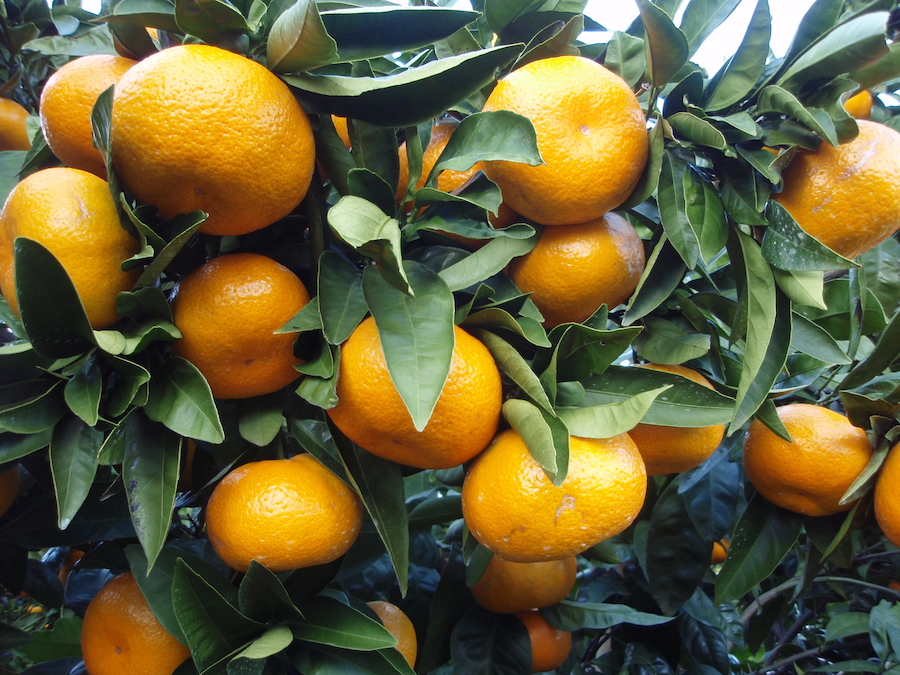このページを 日本語 で読む
Both businesses and consumers are bearing the heavy burden of ongoing price increases. As such, initiatives to address food loss that prevent wasteful disposal are becoming increasingly important. Some estimate that the monetary equivalent of Japan's annual food loss exceeds ¥2 trillion JPY ($15 billion USD).
Various efforts are underway in the private sector to ease the burden by reducing the amount of food that is thrown away. The use of photocatalysts and controlling the respiration of fruits are among them.
Photocatalysts Prevent Food Loss
A rectangular device has been placed in the storage facility of a mandarin orange farm in Shizuoka City. It has an airflow fan on its side and a blue light. Osaka-based Kaltec Corporation, a manufacturer and vendor of photocatalytic sterilizers and deodorizers, jointly developed this prototype with a company in the city of Hamamatsu in Shizuoka. It was designed to keep food fresh.
'Photocatalyst' is a general term for a substance that promotes chemical reactions when exposed to light. The reactive oxygen produced by the reaction is believed to break down mold and bacteria in the air. More importantly, it can break down ethylene gas, which causes fruits and vegetables to ripen.
Fruits like mandarin oranges continue to ripen after harvest due to the ethylene gas they release. When they lose their freshness or go bad, they become unsellable. The prototype device shines light on the photocatalyst. The purified air is then blown throughout the storage area by the airflow fan, reducing spoiling and maintaining freshness.
A test was conducted last year at a farm in Shizuoka City. Installation of a photocatalytic device in a facility storing four tons of mandarin oranges reduced the rate of spoilage from 11.8% to 0.75%. In monetary terms, a loss of ¥225,000 JPY ($1650 USD) was prevented.
Kaltec President Junichi Somei emphasizes, "Using photocatalytic equipment, we can reduce food loss and increase profits." The device is already available in Shizuoka Prefecture, and the company plans to market the product in other parts of the country following verification trials at test orchards and other facilities.
The company also plans to sell small photocatalytic devices to overseas facilities that ship bananas to Japan. Somei notes, "If photocatalytic devices are used to sterilize the air on the shipping side, we may be able to reduce waste after shipments arrive in Japan."
Fresh Avocados for 7 to 8 Weeks
Daikin Industries sells shipping containers that maintain freshness by controlling the 'breathing' of fruit.
During transport, fruits absorb oxygen and release carbon dioxide, heat, and moisture as they lose freshness. Ethylene gas is also released, making control of this respiration essential for prolonging the life of the fruit. Daikin has opted to inject nitrogen gas into containers to reduce the oxygen concentration.
Air conditioning technology developed over the years has also made it possible to control the internal temperature in increments of 0.1 degrees to maintain freshness for longer periods of time. This method is particularly effective for avocados, which have a high respiration rate and spoil quickly. Avocadoes previously could be kept fresh for only two to three weeks after harvest. But by reducing the oxygen concentration to 2-5%, freshness can now be maintained for up to seven to eight weeks.
"We can now transport avocadoes from Mexico on the other side of the planet, and decreasing food loss during transportation will reduce costs," a company spokesperson explained confidently.
Demand is growing for technologies like Daikin's that use nitrogen and other gasses to control air quality inside containers. Of the approximately 150,000 refrigerated containers demanded worldwide annually, 15,000 are equipped with this technology.
Daikin has the second-largest market share in the industry and had a record number of sales in 2022. "As transportation costs rise, there will be even greater demand for products that reduce food loss due to spoilage during transport," Daikin's spokesperson noted. Demand is expected to continue to grow.
Benefits at the Supermarket
Reducing food loss and waste is an important issue not only for businesses but also for households. According to Teikoku Databank, the cost of food per household in the current fiscal year is expected to increase by approximately ¥26,000 JPY ($190 USD) from the previous year. Reducing food loss will be essential for households to counteract the effects of price increases.
Dr Yuichi Ishimura, associate professor at Kindai University's Department of Economics, estimates that household food loss in Japan amounts to about ¥900 billion JPY ($6.5 billion USD) every year. Food loss from restaurants and supermarkets is even higher than that from households. Even conservative estimates show that more ¥2 trillion JPY of food is wasted each year in Japan.
Dr Ishimura’s research group is working on household food loss reduction. It conducted a social experiment on 388 households nationwide. At the start of the program, an average of ¥1,422 JPY worth of food loss per household per month was generated. But when these results were communicated to participants, they then reduced waste by approximately 30%.
"Showing people what their food loss looks like is effective. Particularly when shown in monetary terms, behavior is likely to change," said Dr Ishimura.
Some companies are using smartphone apps to help households reduce food loss. In January of 2023, Toshiba Data, a subsidiary of Toshiba Corporation, conducted an experiment on food loss reduction using an app in collaboration with Sapporo Holdings and other companies.
The system is designed to register data on food purchased through an electronic receipt service, and recipes and dietary improvements are suggested to prevent food loss from occurring. If consumers follow the suggestions, points are accrued that can be used at cooperating supermarkets.
A Toshiba Data spokesperson remarked, "In the last two weeks of the experiment, food waste from households was reduced by about 55%. We plan to begin offering this service officially in the future."
Addressing food loss is important not only from the perspective of cost reduction, but also in terms of environmental conservation.
このページを 日本語 で読む
